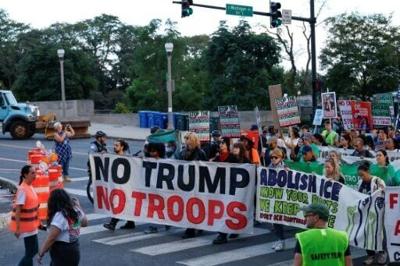Francisco Arriaga offers a weekly dinner in the basement of his Chicago church -- but he doesn't put out many tables these days as worshippers stay away, fearful of anti-migrant sweeps.
"Everyone is scared, not just the undocumented," said Arriaga, music director of St Paul's Catholic Church in the city's Pilsen neighborhood, a hub for Latinos.
"I'd normally have double the amount of tables set up, but only three people showed up at our last meeting," he told AFP.
Foot traffic on Cermak Road, the neighborhood’s main artery and home to businesses and restaurants, has slumped in recent weeks as President Donald Trump vows raids and threatens to send in National Guard troops.
"If people think it will stop with the immigrant community, it will allow the Trump regime to normalize this, and anybody can be next," said Byron Sigcho-Lopez, a local alderman.
Any major operation in Chicago will echo Trump's action in Los Angeles and Washington as the president pushes ahead with his election-winning vow to deport illegal migrants.
Sigcho-Lopez said arrests in Chicago by Immigration and Customs Enforcement (ICE) have been scattered so far, but people are waiting and wondering how to react.
"Trump is instigating, that’s his play. We tell people that it’s important to stay calm and record it on their phones, to document what is happening," said Sigcho-Lopez.
Chicago’s population of 2.7 million includes more than 800,000 who identified as Hispanic or Latino in the 2020 census and it is estimated that 150,000 people in the city are undocumented, making up about eight percent of households.
- Fears of violence -
Brothers Eric Ruiz, 45, and Jessie Ruiz, 50, are Pilsen residents since childhood, and are US citizens like their father -- but they still fear arbitrary arrest.
"It’s constantly in the back of my head. I worry for the sake of my father, who is in his 70s," Eric said.
Jessie Ruiz added "we grew up here and this is not something we ever had to deal with," and he predicted pushback from Chicago residents.
"The city won't take kindly to having ICE conduct raids here and that will be (Trump's) excuse to send in the National Guard."
Mike Oboza, a nightclub singer, recently witnessed an ICE arrest in Pilsen and said he had been left badly shaken.
"I didn't know what to do. I was just frozen," Oboza said. "I don’t know when or if I’ll be able to sing again."
Robert Pape, a professor of political science at the University of Chicago who has studied political violence for decades, fears the city could be a "powder keg."
"I've been stressing the need for the community to publicly, vocally repeat the non-violence message," he told AFP, added that troops might be welcomed by some.
"There is often the honeymoon period," Pape said citing federal forces deployed in Portland, Oregon, in the summer of 2020, but explaining that occupations usually end up exacerbating widespread civil unrest and political violence.
"People don't like crime, but they don't like military occupations even more, and they certainly won't like a police state if it goes on for months and months."
- Staying home -
For now, residents, especially those in the Latino community, are doing their best to go about their lives and to speak up for others.
That's what Vanessa Escobar, an 18-year-old student at Roosevelt University, said she was doing Monday night at a downtown Chicago protest against ICE, six miles from Pilsen.
"I'm Mexican-American and it's important for my community to have our voices heard. I'm here for the others who are too afraid to come out. What Trump has been doing is terrifying," Escobar said.
While many others are staying home and curtailing their daily movements, a morale booster came with the announcement that El Grito, a Mexican Independence Day celebration that was postponed because of increased ICE activity, is back on.
It is now to take place at St Paul Catholic Church next week.
Arriaga said while he thinks some Latinos will still skip the festival, this year the church may attract a new audience.
"There may be more non-Latinos -- allies, and that’s a good thing."
str/bgs/sms















(0) comments
Welcome to the discussion.
Log In
Keep it Clean. Please avoid obscene, vulgar, lewd, racist or sexually-oriented language.
PLEASE TURN OFF YOUR CAPS LOCK.
Don't Threaten. Threats of harming another person will not be tolerated.
Be Truthful. Don't knowingly lie about anyone or anything.
Be Nice. No racism, sexism or any sort of -ism that is degrading to another person.
Be Proactive. Use the 'Report' link on each comment to let us know of abusive posts.
Share with Us. We'd love to hear eyewitness accounts, the history behind an article.